Nursing Assignment: Spiritual Needs Assessment and Patient Autonomy
VerifiedAdded on 2023/01/03
|6
|1473
|26
Homework Assignment
AI Summary
This nursing assignment delves into the intersection of Christian faith and healthcare practices, using a case study involving a family facing a critical medical decision. The assignment explores the ethical dilemmas faced by a physician when balancing patient autonomy with the potential harm to a patient, particularly in the context of a Christian worldview. It examines how Christians should perceive sickness, health, and medical interventions, emphasizing the importance of balancing faith with practical medical approaches. The assignment also highlights the significance of spiritual needs assessment in providing comprehensive patient care, discussing how such assessments can help healthcare providers support patients and families in making informed decisions that align with their beliefs. The student analyzes the application of beneficence and nonmaleficence, offering insights into ethical considerations within a healthcare setting and promoting the importance of cultural competence among health practitioners.
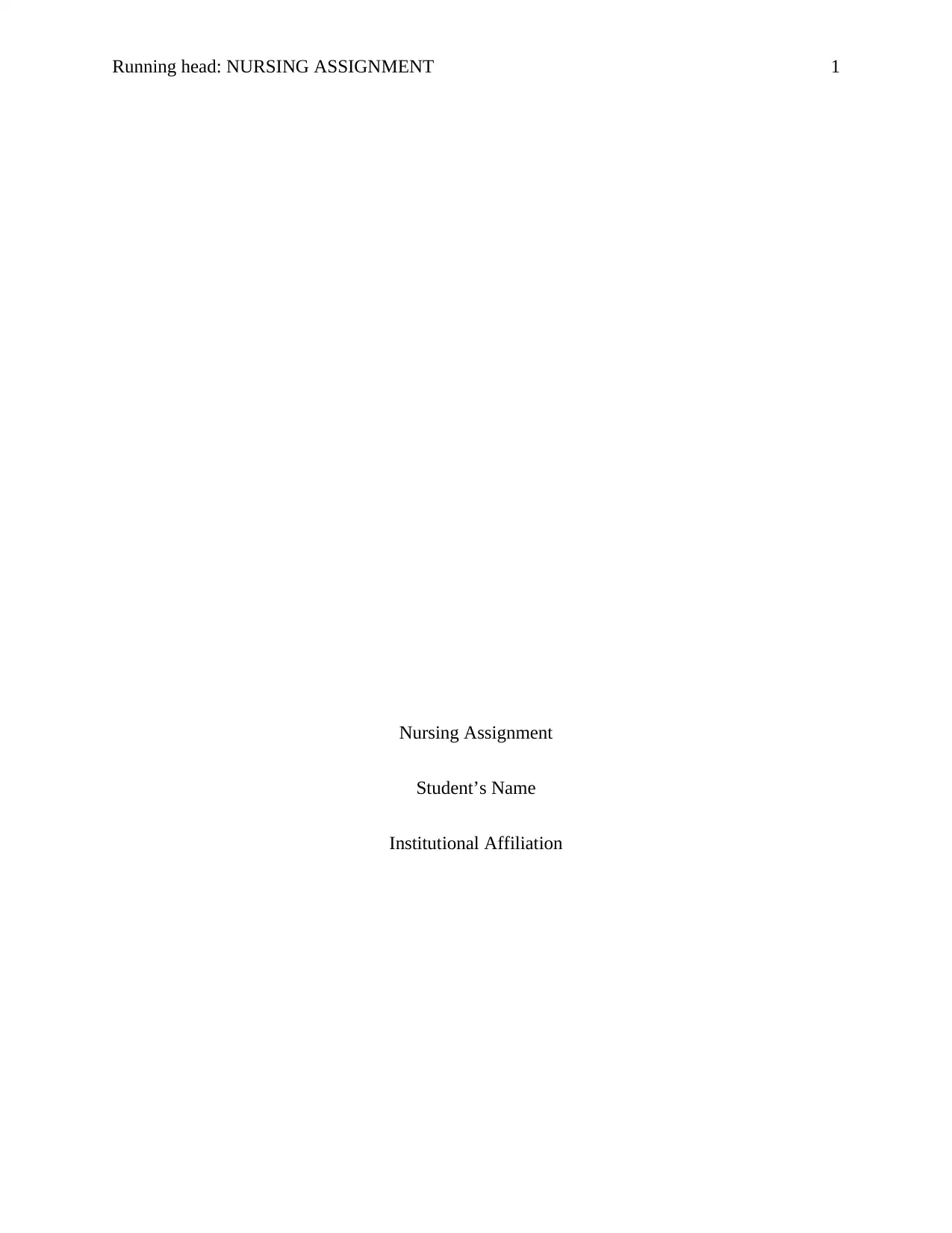
Running head: NURSING ASSIGNMENT 1
Nursing Assignment
Student’s Name
Institutional Affiliation
Nursing Assignment
Student’s Name
Institutional Affiliation
Paraphrase This Document
Need a fresh take? Get an instant paraphrase of this document with our AI Paraphraser
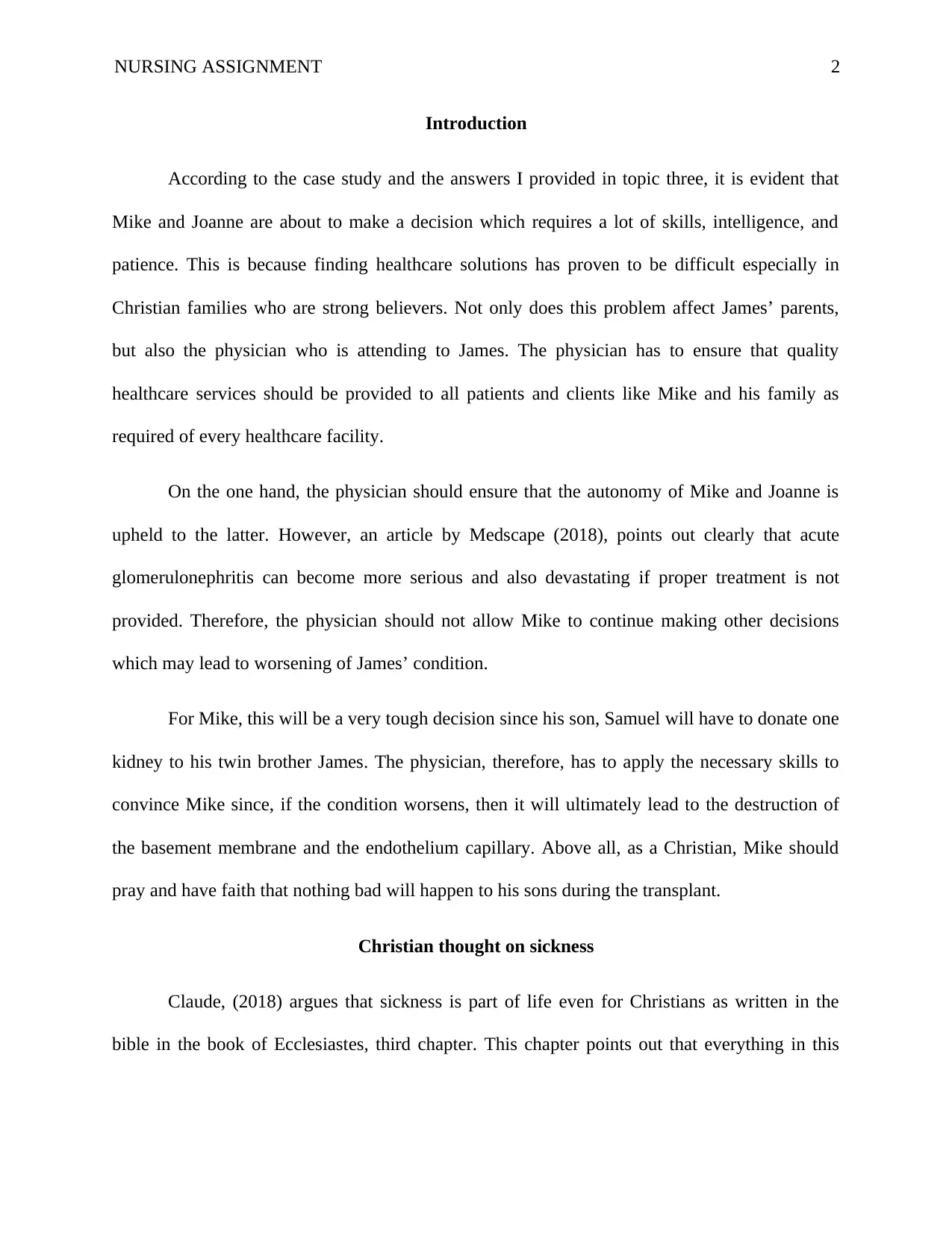
NURSING ASSIGNMENT 2
Introduction
According to the case study and the answers I provided in topic three, it is evident that
Mike and Joanne are about to make a decision which requires a lot of skills, intelligence, and
patience. This is because finding healthcare solutions has proven to be difficult especially in
Christian families who are strong believers. Not only does this problem affect James’ parents,
but also the physician who is attending to James. The physician has to ensure that quality
healthcare services should be provided to all patients and clients like Mike and his family as
required of every healthcare facility.
On the one hand, the physician should ensure that the autonomy of Mike and Joanne is
upheld to the latter. However, an article by Medscape (2018), points out clearly that acute
glomerulonephritis can become more serious and also devastating if proper treatment is not
provided. Therefore, the physician should not allow Mike to continue making other decisions
which may lead to worsening of James’ condition.
For Mike, this will be a very tough decision since his son, Samuel will have to donate one
kidney to his twin brother James. The physician, therefore, has to apply the necessary skills to
convince Mike since, if the condition worsens, then it will ultimately lead to the destruction of
the basement membrane and the endothelium capillary. Above all, as a Christian, Mike should
pray and have faith that nothing bad will happen to his sons during the transplant.
Christian thought on sickness
Claude, (2018) argues that sickness is part of life even for Christians as written in the
bible in the book of Ecclesiastes, third chapter. This chapter points out that everything in this
Introduction
According to the case study and the answers I provided in topic three, it is evident that
Mike and Joanne are about to make a decision which requires a lot of skills, intelligence, and
patience. This is because finding healthcare solutions has proven to be difficult especially in
Christian families who are strong believers. Not only does this problem affect James’ parents,
but also the physician who is attending to James. The physician has to ensure that quality
healthcare services should be provided to all patients and clients like Mike and his family as
required of every healthcare facility.
On the one hand, the physician should ensure that the autonomy of Mike and Joanne is
upheld to the latter. However, an article by Medscape (2018), points out clearly that acute
glomerulonephritis can become more serious and also devastating if proper treatment is not
provided. Therefore, the physician should not allow Mike to continue making other decisions
which may lead to worsening of James’ condition.
For Mike, this will be a very tough decision since his son, Samuel will have to donate one
kidney to his twin brother James. The physician, therefore, has to apply the necessary skills to
convince Mike since, if the condition worsens, then it will ultimately lead to the destruction of
the basement membrane and the endothelium capillary. Above all, as a Christian, Mike should
pray and have faith that nothing bad will happen to his sons during the transplant.
Christian thought on sickness
Claude, (2018) argues that sickness is part of life even for Christians as written in the
bible in the book of Ecclesiastes, third chapter. This chapter points out that everything in this
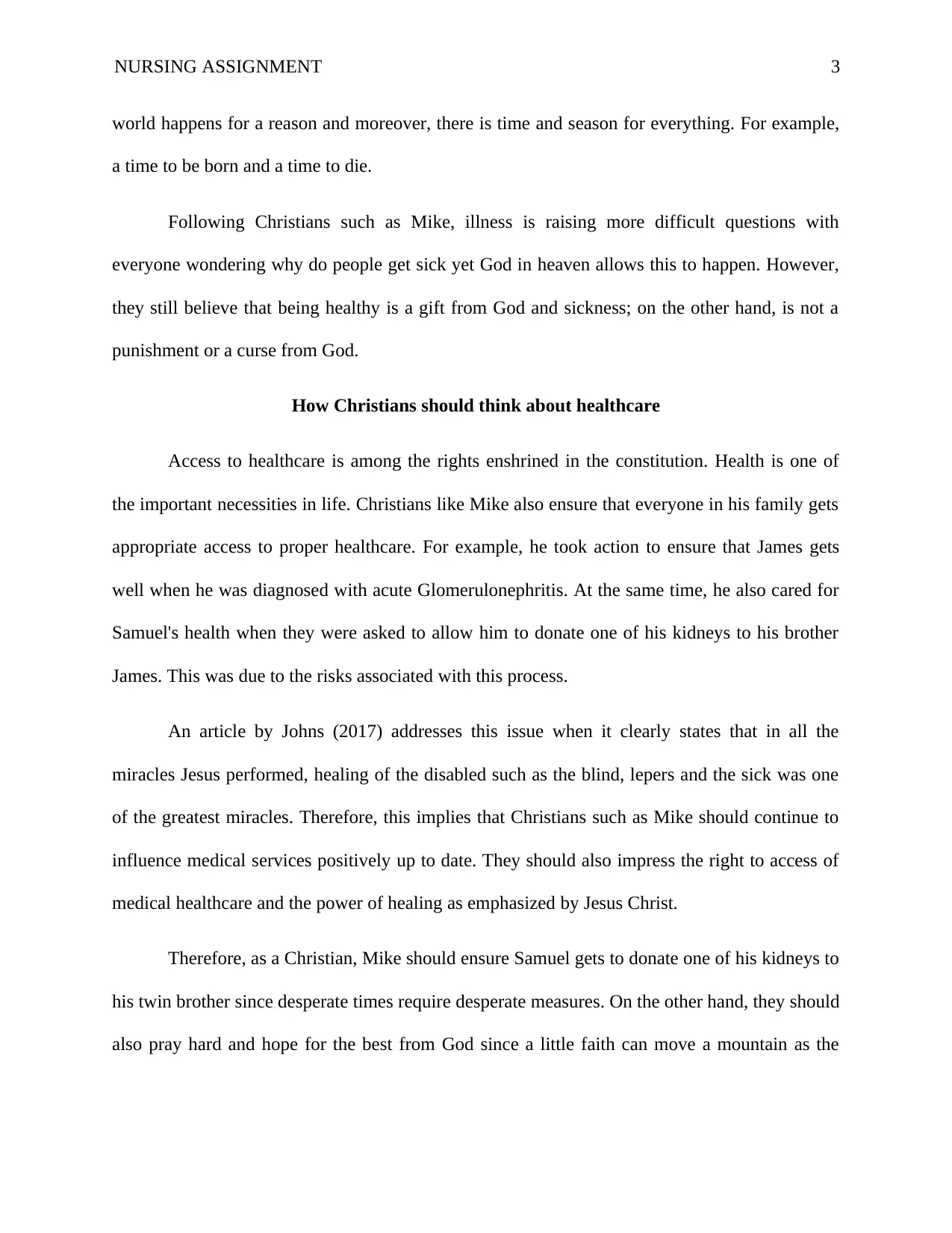
NURSING ASSIGNMENT 3
world happens for a reason and moreover, there is time and season for everything. For example,
a time to be born and a time to die.
Following Christians such as Mike, illness is raising more difficult questions with
everyone wondering why do people get sick yet God in heaven allows this to happen. However,
they still believe that being healthy is a gift from God and sickness; on the other hand, is not a
punishment or a curse from God.
How Christians should think about healthcare
Access to healthcare is among the rights enshrined in the constitution. Health is one of
the important necessities in life. Christians like Mike also ensure that everyone in his family gets
appropriate access to proper healthcare. For example, he took action to ensure that James gets
well when he was diagnosed with acute Glomerulonephritis. At the same time, he also cared for
Samuel's health when they were asked to allow him to donate one of his kidneys to his brother
James. This was due to the risks associated with this process.
An article by Johns (2017) addresses this issue when it clearly states that in all the
miracles Jesus performed, healing of the disabled such as the blind, lepers and the sick was one
of the greatest miracles. Therefore, this implies that Christians such as Mike should continue to
influence medical services positively up to date. They should also impress the right to access of
medical healthcare and the power of healing as emphasized by Jesus Christ.
Therefore, as a Christian, Mike should ensure Samuel gets to donate one of his kidneys to
his twin brother since desperate times require desperate measures. On the other hand, they should
also pray hard and hope for the best from God since a little faith can move a mountain as the
world happens for a reason and moreover, there is time and season for everything. For example,
a time to be born and a time to die.
Following Christians such as Mike, illness is raising more difficult questions with
everyone wondering why do people get sick yet God in heaven allows this to happen. However,
they still believe that being healthy is a gift from God and sickness; on the other hand, is not a
punishment or a curse from God.
How Christians should think about healthcare
Access to healthcare is among the rights enshrined in the constitution. Health is one of
the important necessities in life. Christians like Mike also ensure that everyone in his family gets
appropriate access to proper healthcare. For example, he took action to ensure that James gets
well when he was diagnosed with acute Glomerulonephritis. At the same time, he also cared for
Samuel's health when they were asked to allow him to donate one of his kidneys to his brother
James. This was due to the risks associated with this process.
An article by Johns (2017) addresses this issue when it clearly states that in all the
miracles Jesus performed, healing of the disabled such as the blind, lepers and the sick was one
of the greatest miracles. Therefore, this implies that Christians such as Mike should continue to
influence medical services positively up to date. They should also impress the right to access of
medical healthcare and the power of healing as emphasized by Jesus Christ.
Therefore, as a Christian, Mike should ensure Samuel gets to donate one of his kidneys to
his twin brother since desperate times require desperate measures. On the other hand, they should
also pray hard and hope for the best from God since a little faith can move a mountain as the
⊘ This is a preview!⊘
Do you want full access?
Subscribe today to unlock all pages.

Trusted by 1+ million students worldwide
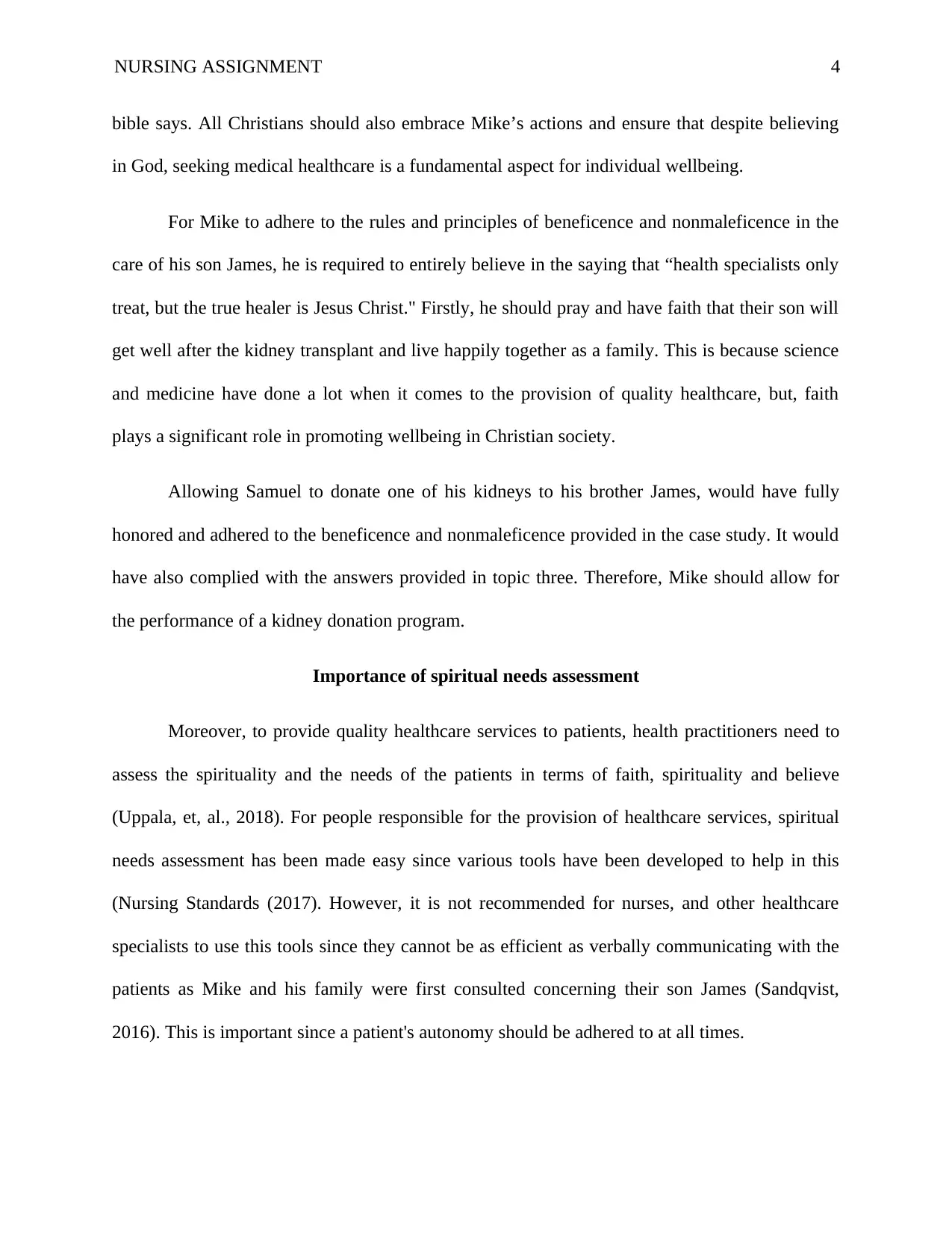
NURSING ASSIGNMENT 4
bible says. All Christians should also embrace Mike’s actions and ensure that despite believing
in God, seeking medical healthcare is a fundamental aspect for individual wellbeing.
For Mike to adhere to the rules and principles of beneficence and nonmaleficence in the
care of his son James, he is required to entirely believe in the saying that “health specialists only
treat, but the true healer is Jesus Christ." Firstly, he should pray and have faith that their son will
get well after the kidney transplant and live happily together as a family. This is because science
and medicine have done a lot when it comes to the provision of quality healthcare, but, faith
plays a significant role in promoting wellbeing in Christian society.
Allowing Samuel to donate one of his kidneys to his brother James, would have fully
honored and adhered to the beneficence and nonmaleficence provided in the case study. It would
have also complied with the answers provided in topic three. Therefore, Mike should allow for
the performance of a kidney donation program.
Importance of spiritual needs assessment
Moreover, to provide quality healthcare services to patients, health practitioners need to
assess the spirituality and the needs of the patients in terms of faith, spirituality and believe
(Uppala, et, al., 2018). For people responsible for the provision of healthcare services, spiritual
needs assessment has been made easy since various tools have been developed to help in this
(Nursing Standards (2017). However, it is not recommended for nurses, and other healthcare
specialists to use this tools since they cannot be as efficient as verbally communicating with the
patients as Mike and his family were first consulted concerning their son James (Sandqvist,
2016). This is important since a patient's autonomy should be adhered to at all times.
bible says. All Christians should also embrace Mike’s actions and ensure that despite believing
in God, seeking medical healthcare is a fundamental aspect for individual wellbeing.
For Mike to adhere to the rules and principles of beneficence and nonmaleficence in the
care of his son James, he is required to entirely believe in the saying that “health specialists only
treat, but the true healer is Jesus Christ." Firstly, he should pray and have faith that their son will
get well after the kidney transplant and live happily together as a family. This is because science
and medicine have done a lot when it comes to the provision of quality healthcare, but, faith
plays a significant role in promoting wellbeing in Christian society.
Allowing Samuel to donate one of his kidneys to his brother James, would have fully
honored and adhered to the beneficence and nonmaleficence provided in the case study. It would
have also complied with the answers provided in topic three. Therefore, Mike should allow for
the performance of a kidney donation program.
Importance of spiritual needs assessment
Moreover, to provide quality healthcare services to patients, health practitioners need to
assess the spirituality and the needs of the patients in terms of faith, spirituality and believe
(Uppala, et, al., 2018). For people responsible for the provision of healthcare services, spiritual
needs assessment has been made easy since various tools have been developed to help in this
(Nursing Standards (2017). However, it is not recommended for nurses, and other healthcare
specialists to use this tools since they cannot be as efficient as verbally communicating with the
patients as Mike and his family were first consulted concerning their son James (Sandqvist,
2016). This is important since a patient's autonomy should be adhered to at all times.
Paraphrase This Document
Need a fresh take? Get an instant paraphrase of this document with our AI Paraphraser
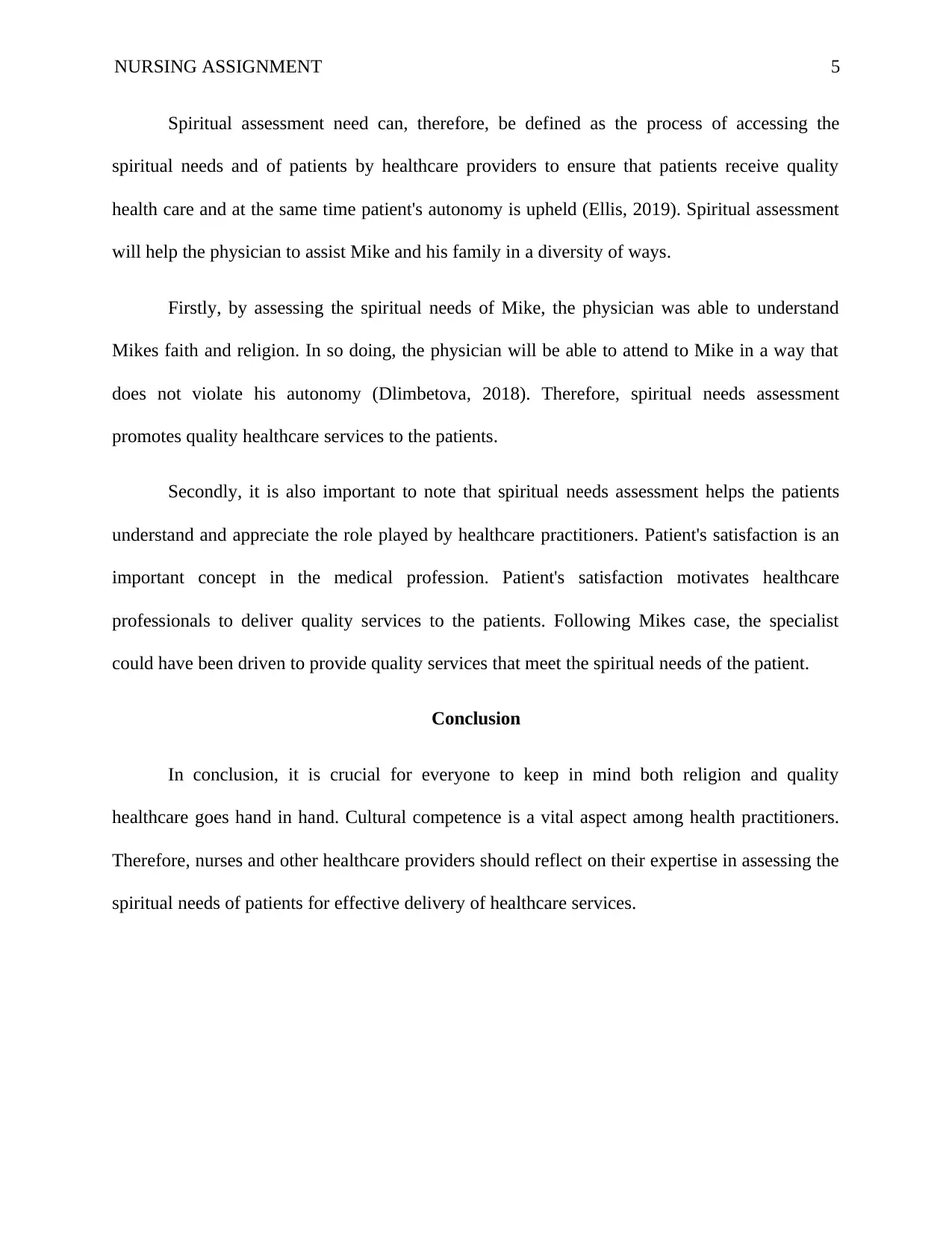
NURSING ASSIGNMENT 5
Spiritual assessment need can, therefore, be defined as the process of accessing the
spiritual needs and of patients by healthcare providers to ensure that patients receive quality
health care and at the same time patient's autonomy is upheld (Ellis, 2019). Spiritual assessment
will help the physician to assist Mike and his family in a diversity of ways.
Firstly, by assessing the spiritual needs of Mike, the physician was able to understand
Mikes faith and religion. In so doing, the physician will be able to attend to Mike in a way that
does not violate his autonomy (Dlimbetova, 2018). Therefore, spiritual needs assessment
promotes quality healthcare services to the patients.
Secondly, it is also important to note that spiritual needs assessment helps the patients
understand and appreciate the role played by healthcare practitioners. Patient's satisfaction is an
important concept in the medical profession. Patient's satisfaction motivates healthcare
professionals to deliver quality services to the patients. Following Mikes case, the specialist
could have been driven to provide quality services that meet the spiritual needs of the patient.
Conclusion
In conclusion, it is crucial for everyone to keep in mind both religion and quality
healthcare goes hand in hand. Cultural competence is a vital aspect among health practitioners.
Therefore, nurses and other healthcare providers should reflect on their expertise in assessing the
spiritual needs of patients for effective delivery of healthcare services.
Spiritual assessment need can, therefore, be defined as the process of accessing the
spiritual needs and of patients by healthcare providers to ensure that patients receive quality
health care and at the same time patient's autonomy is upheld (Ellis, 2019). Spiritual assessment
will help the physician to assist Mike and his family in a diversity of ways.
Firstly, by assessing the spiritual needs of Mike, the physician was able to understand
Mikes faith and religion. In so doing, the physician will be able to attend to Mike in a way that
does not violate his autonomy (Dlimbetova, 2018). Therefore, spiritual needs assessment
promotes quality healthcare services to the patients.
Secondly, it is also important to note that spiritual needs assessment helps the patients
understand and appreciate the role played by healthcare practitioners. Patient's satisfaction is an
important concept in the medical profession. Patient's satisfaction motivates healthcare
professionals to deliver quality services to the patients. Following Mikes case, the specialist
could have been driven to provide quality services that meet the spiritual needs of the patient.
Conclusion
In conclusion, it is crucial for everyone to keep in mind both religion and quality
healthcare goes hand in hand. Cultural competence is a vital aspect among health practitioners.
Therefore, nurses and other healthcare providers should reflect on their expertise in assessing the
spiritual needs of patients for effective delivery of healthcare services.
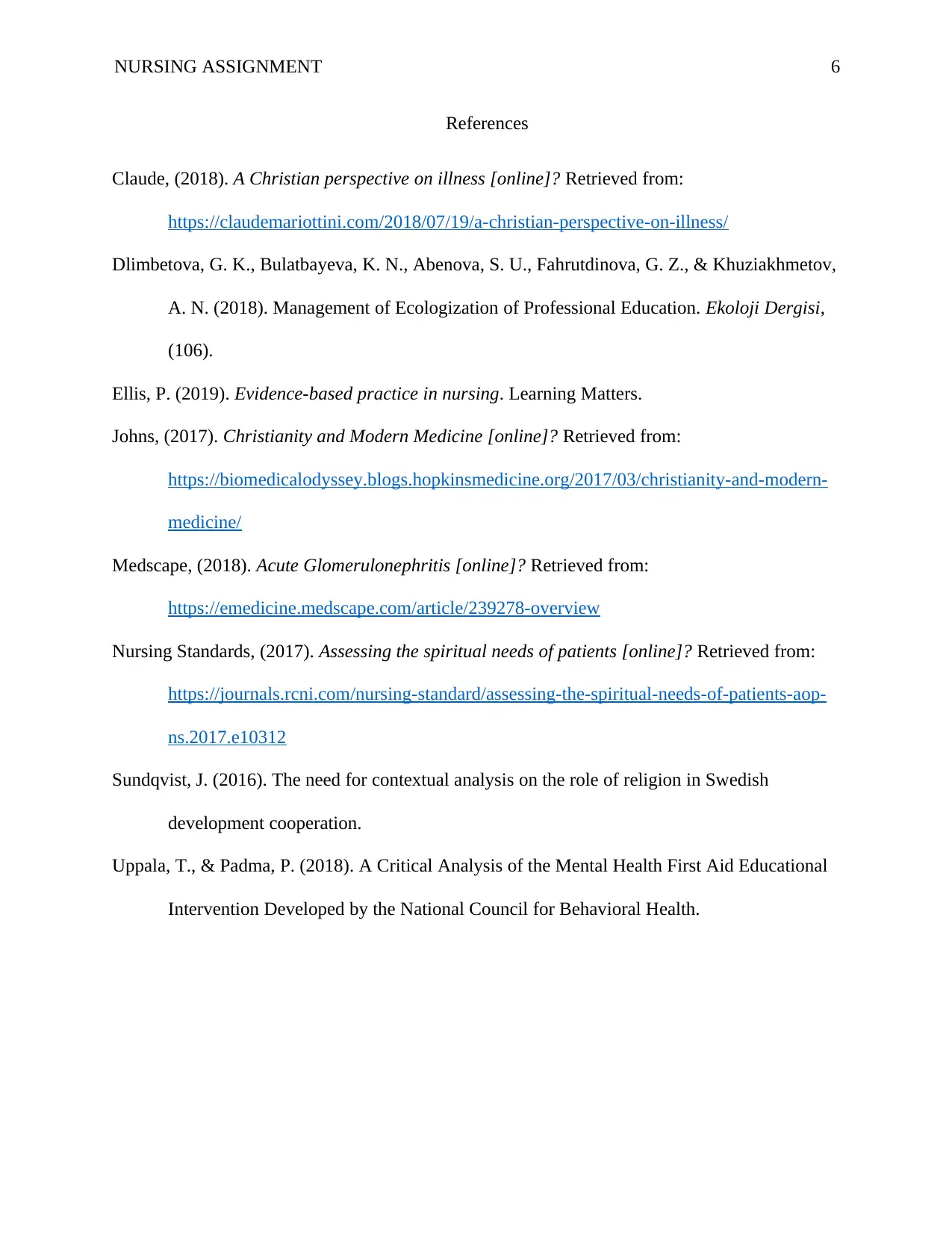
NURSING ASSIGNMENT 6
References
Claude, (2018). A Christian perspective on illness [online]? Retrieved from:
https://claudemariottini.com/2018/07/19/a-christian-perspective-on-illness/
Dlimbetova, G. K., Bulatbayeva, K. N., Abenova, S. U., Fahrutdinova, G. Z., & Khuziakhmetov,
A. N. (2018). Management of Ecologization of Professional Education. Ekoloji Dergisi,
(106).
Ellis, P. (2019). Evidence-based practice in nursing. Learning Matters.
Johns, (2017). Christianity and Modern Medicine [online]? Retrieved from:
https://biomedicalodyssey.blogs.hopkinsmedicine.org/2017/03/christianity-and-modern-
medicine/
Medscape, (2018). Acute Glomerulonephritis [online]? Retrieved from:
https://emedicine.medscape.com/article/239278-overview
Nursing Standards, (2017). Assessing the spiritual needs of patients [online]? Retrieved from:
https://journals.rcni.com/nursing-standard/assessing-the-spiritual-needs-of-patients-aop-
ns.2017.e10312
Sundqvist, J. (2016). The need for contextual analysis on the role of religion in Swedish
development cooperation.
Uppala, T., & Padma, P. (2018). A Critical Analysis of the Mental Health First Aid Educational
Intervention Developed by the National Council for Behavioral Health.
References
Claude, (2018). A Christian perspective on illness [online]? Retrieved from:
https://claudemariottini.com/2018/07/19/a-christian-perspective-on-illness/
Dlimbetova, G. K., Bulatbayeva, K. N., Abenova, S. U., Fahrutdinova, G. Z., & Khuziakhmetov,
A. N. (2018). Management of Ecologization of Professional Education. Ekoloji Dergisi,
(106).
Ellis, P. (2019). Evidence-based practice in nursing. Learning Matters.
Johns, (2017). Christianity and Modern Medicine [online]? Retrieved from:
https://biomedicalodyssey.blogs.hopkinsmedicine.org/2017/03/christianity-and-modern-
medicine/
Medscape, (2018). Acute Glomerulonephritis [online]? Retrieved from:
https://emedicine.medscape.com/article/239278-overview
Nursing Standards, (2017). Assessing the spiritual needs of patients [online]? Retrieved from:
https://journals.rcni.com/nursing-standard/assessing-the-spiritual-needs-of-patients-aop-
ns.2017.e10312
Sundqvist, J. (2016). The need for contextual analysis on the role of religion in Swedish
development cooperation.
Uppala, T., & Padma, P. (2018). A Critical Analysis of the Mental Health First Aid Educational
Intervention Developed by the National Council for Behavioral Health.
⊘ This is a preview!⊘
Do you want full access?
Subscribe today to unlock all pages.

Trusted by 1+ million students worldwide
1 out of 6
Related Documents
Your All-in-One AI-Powered Toolkit for Academic Success.
+13062052269
info@desklib.com
Available 24*7 on WhatsApp / Email
![[object Object]](/_next/static/media/star-bottom.7253800d.svg)
Unlock your academic potential
Copyright © 2020–2026 A2Z Services. All Rights Reserved. Developed and managed by ZUCOL.





